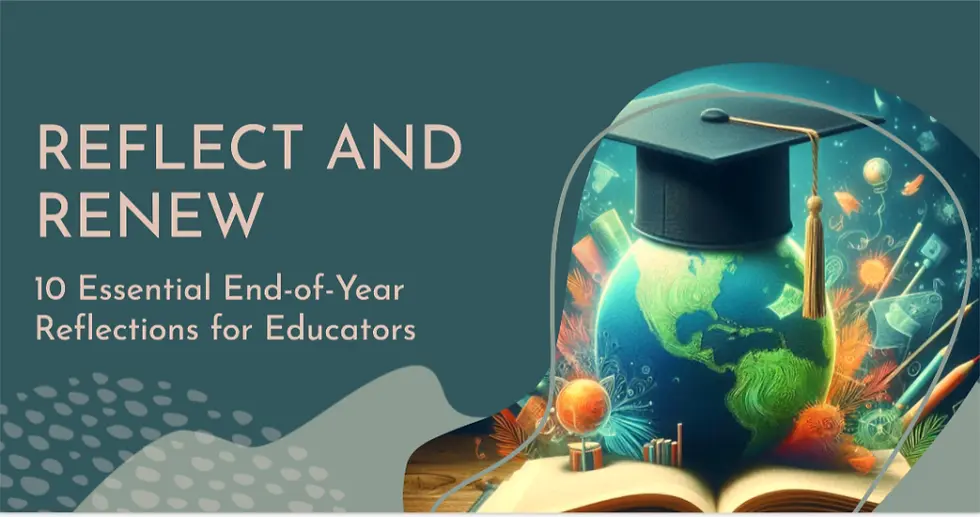Reflect and Renew: 10 Essential End-of-Year Reflections for Educators
- maged mahrous
- Aug 15, 2025
- 3 min read

As the academic year comes to a close, it offers an ideal moment for educators to pause and reflect on their experiences. Reflection isn’t merely about reviewing the past; it’s also about preparing to advance with enhanced insight. This article presents crucial reflections to help educators evaluate their practices, comprehend their impact, and plan for the future with renewed enthusiasm and understanding.
Assessment of Educational Goals
Assessment underpins educational improvement. Reflect on the past year by considering:
Evaluating Curriculum Outcomes: How well did the actual student outcomes align with the intended learning objectives? Identify areas where students excelled or faced challenges, and explore possible reasons.
Teaching Methods Analysis: Assess the effectiveness of your teaching strategies. Identify what was successful and what was not. Highlight any innovative methods that particularly engaged your students.
Future Goals Setting: Using your reflections, set achievable goals for the upcoming academic year. Aim to enhance successful strategies and improve weaker ones.
Student Progress and Development
Understanding student development over the past year is essential for effective teaching.
Individual Achievement Overview: Examine each student’s academic achievement and personal growth.
Support Systems Efficiency: Evaluate the effectiveness of the support systems in place for aiding struggling students.
Planning Student-Centric Improvements: Based on feedback and observations, plan modifications that focus more directly on student needs, potentially customizing learning paths.
Professional Development Reflection
Your development as an educator is crucial.
Skills and Knowledge Expansion: Have you acquired new skills or deeper knowledge in your field this year? Reflect on the sources of your learning and their impact.
Application of New Strategies: How effectively have you integrated new teaching methods or technologies into your classroom?
Future Learning Opportunities: Identify areas where further education or training could enhance your effectiveness as an educator.
Technological Integration
Technology plays a critical role in modern education. Consider its use in your classroom:
Current Technology Use: Assess how effectively technology has been utilized and whether it has enhanced learning outcomes.
Challenges in Technological Implementation: Address the challenges faced in implementing technology and how they were overcome.
Future Technological Needs: Anticipate future technological advancements that could improve educational delivery.
Classroom Management and Environment
The classroom environment greatly influences learning.
Classroom Dynamics: Reflect on the interactions within your classroom. How do students engage with each other and with you?
Behavior Management Strategies: Examine the effectiveness of your behavior management strategies and consider any needed adjustments.
Physical and Emotional Environment: Review both the physical setting and the emotional tone of your classroom. Are they conducive to learning?
Engagement and Communication with Parents
Parental engagement is crucial for a holistic educational experience.
Communication Effectiveness: Evaluate the effectiveness of your communication with parents. Are improvements needed?
Parent Involvement: Assess the extent and impact of parent involvement on student outcomes.
Plans for Enhanced Collaboration: Develop strategies for better communication and cooperation with parents, such as regular updates or interactive sessions.
Impact on Community and Outreach
Education extends beyond the classroom into the community.
Community Involvement: Review how your educational activities have engaged with the broader community.
Service Learning Projects: Reflect on community service projects and their outcomes.
Future Community Connections: Plan future initiatives to further connect your educational efforts with community needs.
Collaboration and Teamwork Among Staff
Collaboration among staff enhances the educational experience.
Team Dynamics: Evaluate the effectiveness of teamwork within your staff and identify areas for improvement.
Professional Support Systems: Assess the adequacy and effectiveness of support systems for staff.
Improving Team Collaboration: Explore strategies to enhance teamwork and morale.
Leadership and Administrative Support
Appropriate support significantly impacts educational quality.
Support from Administration: Analyze the support you’ve received from your administration and identify any gaps.
Leadership Opportunities: Reflect on your leadership experiences and their contributions to your growth.
Feedback to Administration: Prepare constructive feedback for your administrators to improve support for educators.
Personal and Emotional Reflection
Your well-being is vital to your professional effectiveness.
Work-Life Balance: Assess your work-life balance and consider ways to improve it.
Emotional Resilience: Reflect on how you’ve managed stress and challenges throughout the year.
Self-Care Plans: Devise strategies to maintain or enhance your self-care practices to ensure your well-being.
Reflecting on these areas lays a foundation for both professional and personal growth and enhances the educational experience for your students. As you prepare for the new academic year, employ these insights to foster a more supportive and effective educational environment.




Comments